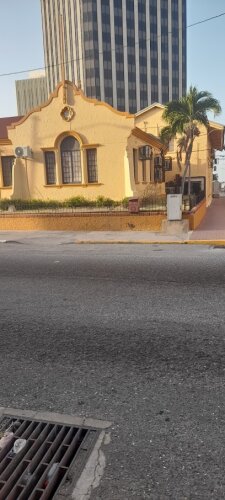Best Biotechnology Lawyers in Jamaica
Share your needs with us, get contacted by law firms.
Free. Takes 2 min.
Or refine your search by selecting a city:
List of the best lawyers in Jamaica
About Biotechnology Law in Jamaica:
Biotechnology in Jamaica encompasses a wide range of activities that involve the manipulation of living organisms or their components to develop products and technologies for various industries such as agriculture, healthcare, and environmental management. The legal framework governing biotechnology in Jamaica is still evolving, with regulations aiming to ensure the safe and ethical use of biotechnological innovations.
Why You May Need a Lawyer:
You may need a lawyer in the field of biotechnology in Jamaica for various reasons, including drafting and negotiating licensing agreements for intellectual property rights, obtaining regulatory approvals for biotechnological products, handling disputes related to intellectual property infringement, and ensuring compliance with local laws and regulations governing biotechnology activities.
Local Laws Overview:
In Jamaica, the National Environment and Planning Agency (NEPA) is the primary regulatory body responsible for overseeing biotechnology activities to ensure their safe and environmentally sustainable implementation. The Biosafety and Biotechnology Unit of NEPA administers the Biosafety Act and Regulations, which govern the importation, handling, and release of genetically modified organisms (GMOs) in Jamaica.
Frequently Asked Questions:
1. What is the regulatory framework for biotechnology in Jamaica?
The regulatory framework for biotechnology in Jamaica is primarily governed by the Biosafety Act and Regulations, which oversee the handling, importation, and release of GMOs.
2. Do I need regulatory approvals for conducting biotechnology research in Jamaica?
Yes, you may need regulatory approvals from NEPA's Biosafety and Biotechnology Unit before commencing any biotechnology research involving GMOs in Jamaica.
3. How can a lawyer assist with intellectual property rights in biotechnology?
A lawyer can help you draft and negotiate licensing agreements for intellectual property rights related to biotechnological innovations, as well as handle any disputes related to intellectual property infringement.
4. What are the consequences of non-compliance with biotechnology laws in Jamaica?
Non-compliance with biotechnology laws in Jamaica can lead to legal penalties, fines, and the suspension of biotechnological activities that do not adhere to regulatory requirements.
5. Can I import GMOs for research purposes in Jamaica?
Yes, you can import GMOs for research purposes in Jamaica, but you will need to obtain regulatory approvals from NEPA's Biosafety and Biotechnology Unit.
6. How can I ensure compliance with biotechnology laws in Jamaica?
You can ensure compliance with biotechnology laws in Jamaica by seeking legal advice from a qualified lawyer familiar with the local regulatory framework and requirements for biotechnological activities.
7. What are the key considerations when drafting licensing agreements for biotechnological innovations?
Key considerations when drafting licensing agreements for biotechnological innovations include intellectual property rights, royalty payments, exclusivity clauses, and termination provisions.
8. Are there any restrictions on the release of GMOs into the environment in Jamaica?
Yes, there are restrictions on the release of GMOs into the environment in Jamaica, which are governed by the Biosafety Act and Regulations to prevent any adverse effects on human health and the environment.
9. How can I protect my biotechnological inventions in Jamaica?
You can protect your biotechnological inventions in Jamaica by applying for patents to secure exclusive rights to your innovation, as well as drafting confidentiality agreements to safeguard your trade secrets.
10. What role does NEPA play in overseeing biotechnology activities in Jamaica?
NEPA plays a crucial role in overseeing biotechnology activities in Jamaica by ensuring that biotechnological innovations comply with environmental and safety standards to safeguard public health and the environment.
Additional Resources:
For more information on biotechnology regulations and resources in Jamaica, you can visit NEPA's website or contact the Biosafety and Biotechnology Unit for guidance on regulatory requirements and compliance.
Next Steps:
If you require legal assistance in the field of biotechnology in Jamaica, it is advisable to consult with a specialized lawyer knowledgeable about the local regulatory framework and requirements for biotechnological activities. A lawyer can help you navigate the legal complexities of biotechnology laws in Jamaica and ensure compliance with regulatory requirements to protect your interests and innovations.
Lawzana helps you find the best lawyers and law firms in Jamaica through a curated and pre-screened list of qualified legal professionals. Our platform offers rankings and detailed profiles of attorneys and law firms, allowing you to compare based on practice areas, including Biotechnology, experience, and client feedback.
Each profile includes a description of the firm's areas of practice, client reviews, team members and partners, year of establishment, spoken languages, office locations, contact information, social media presence, and any published articles or resources. Most firms on our platform speak English and are experienced in both local and international legal matters.
Get a quote from top-rated law firms in Jamaica — quickly, securely, and without unnecessary hassle.
Disclaimer:
The information provided on this page is for general informational purposes only and does not constitute legal advice. While we strive to ensure the accuracy and relevance of the content, legal information may change over time, and interpretations of the law can vary. You should always consult with a qualified legal professional for advice specific to your situation.
We disclaim all liability for actions taken or not taken based on the content of this page. If you believe any information is incorrect or outdated, please contact us, and we will review and update it where appropriate.
Browse biotechnology law firms by city in Jamaica
Refine your search by selecting a city.










